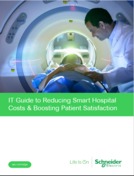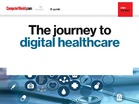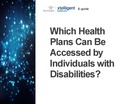A New Model for Healthcare Transformation
By: Dell, Inc. View more from Dell, Inc. >>
Download this next:
Smart Hospitals: How to Reduce Costs
By: Schneider Electric
Type: White Paper
Is it possible to reduce smart hospital costs while boosting patient satisfaction? This white paper asserts that the answer is yes. The paper explores how, by harnessing edge computing, IT professionals in healthcare can reap the above benefits and others like:
- Improved efficiency
- Enhanced data security
- And more
So, what tools can drive edge computing success for hospitals? Keep reading to find out.
These are also closely related to: "A New Model for Healthcare Transformation"
-
The journey to digital healthcare
By: TechTarget ComputerWeekly.com
Type: eGuide
The need for technological solutions in healthcare has never been greater as the NHS deals with unprecedented pressure. From personalised medicine made a reality through genome sequencing, to sharing health data and giving patients access to their own records, the government is ramping up its work on a digital NHS.
In this e-guide we look at how the NHS shared care records projects are progressing, and the European Commission's plans to share health data across borders. We also look at how one NHS trust has created a social media platform to help mental health service users, and examine Scotland's digital health and care strategy.
-
Which Health Plans Can Be Accessed by Individuals with Disabilities?
By: XtelligentMedia Healthcare
Type: eGuide
Public and private payers alike offer a multitude of benefits for people living with disabilities. According to the CDC, up to 27 percent of adults in the United States have some type of disability, including mobility, cognition, independent living, vision, hearing, and self-care disabilities.
Adverse health conditions, such as obesity, heart disease, and diabetes, are more common among those with disabilities. Therefore, affordable access to healthcare is especially important for this population. However, one in four adults with disabilities between 18 and 44 do not have a usual healthcare provider and have unmet healthcare needs due to costs.
In the following article, HealthPayerIntelligence breaks down how people with disabilities can qualify for the different health plans available.
Find more content like what you just read:
-
The patient experience (PX) revolution in healthcare
By: TalkDesk
Type: White Paper
Influenced by their consumer interactions, patients now expect easy, seamless, and personalized healthcare experiences.Gain insights from our major global research survey that show how healthcare providers are rethinking and repositioning contact centers in support of a reimagined PX.
-
Top IT challenges for healthcare organizations in rural areas
By: XtelligentMedia Healthcare
Type: eGuide
Rural healthcare providers have long faced challenges surrounding their geographical isolation and limited financial resources. However, the digital health transformation has ushered in a new set of rural health IT challenges.
-
Top data analytics tools for managing chronic disease
By: XtelligentMedia Healthcare
Type: eGuide
Effective chronic disease management requires healthcare stakeholders to effectively utilize data, population health management systems and predictive analytics tools.
-
How generative AI is reducing administrative burden in healthcare
By: XtelligentMedia Healthcare
Type: eGuide
Over 90% of healthcare workers feel optimistic about the promise of generative AI in healthcare to alleviate administrative burdens, according to a new survey.
-
Secure texting: The next great healthcare communications frontier
By: AVST
Type: eGuide
In this expert e-guide, learn why the first step to secure communications technology (like texting) is convincing leaders and clinicians to recognize the risks to health data.
-
Pharmacometabolomic data application for customized medicine
By: XtelligentMedia Healthcare
Type: eGuide
Pharmacometabolomics can provide additional context for personalized medicine by offering insights beyond genetic data.
-
How to measure the experience of healthcare billing
By: XtelligentMedia Healthcare
Type: eGuide
A new initiative aims to create benchmarks for the healthcare billing experience to improve patient collection rates and overall engagement.
-
Recognizing the Effects of the Healthcare Cyberattack on Providers
By: XtelligentMedia Healthcare
Type: eGuide
From major pharmacy chains to independently owned practices, providers across the country are facing significant operational challenges as the Change Healthcare outages continue.
-
The state of the healthcare consumer experience today
By: The Advisory Board
Type: Research Content
Healthcare consumers weigh several priorities, including access, convenience, cost, quality, and experience, when deciding where — or if — to seek care. As care providers compete on these priorities, view this report for a snapshot of the status quo from which they'll need to differentiate themselves.
-
How Healthcare IoT Resilience Impacts Hospitals
By: Schneider Electric
Type: White Paper
This white paper explores how resilience, efficiency, and security impact overall hospital operations and how IT professionals in healthcare environments can help their hospitals make major strides forward in their IoT and digital transformation. Read on to learn more.
-
Optimizing Care with AI and Machine Learning
By: XSOLIS
Type: White Paper
Download this white paper to understand the pitfalls of traditional utilization management and review (UM/UR) strategies in healthcare and explore the potential of a purpose-built tool that leverages AI and ML to remove subjectivity in the UM/UR process, leading to improved outcomes for payers, providers, and patients.
-
Utilization management: How AI can help patients & providers
By: XSOLIS
Type: White Paper
In this white paper, you’ll discover how AI/ML deployed in operational contexts is becoming a valuable tool to meet the challenge of modernizing health systems and maintaining utilization management. Read on to understand how AI/ML-driven automation can dramatically improve traditional workflows for payers, providers, and ultimately, patients.
-
Micro data centers: Top solution for common healthcare settings
By: Schneider Electric
Type: White Paper
Discover in this white paper how the 3 key pillars for successful edge computing deployments can help your healthcare IT deliver resiliency and reliability.
-
Improving payer-provider collaboration in healthcare with AI
By: XSOLIS
Type: White Paper
Due to a dependence on legacy technology, many clinical teams have been forced to perform more unnecessary administrative tasks and spend less time on clinical interventions. Read on to discover how fully leveraging AI can improve understanding and communication between payers and providers and drive more efficient health outcomes.
-
Healthcare is at the forefront of digital transformation
By: Comcast Business
Type: Infographic
Expert analysts at IDC predict that by 2027, 70% of the healthcare industry will leverage GenAI to address data and workflow fragmentation. Download this infographic to see how healthcare providers are at the forefront of digital transformation and learn what key technologies are needed to fuel the future of healthcare.
-
How edge computing is shaping modern healthcare
By: Schneider Electric
Type: Research Content
As IT leaders in healthcare grapple with these difficulties, using emerging technologies like edge computing can make sure that healthcare organizations and the broader healthcare industry are ready for the future. Access this study to gain a deeper understanding of how edge computing is shaping modern healthcare.
-
Why healthcare market trends are demanding new power solutions
By: Schneider Electric
Type: eBook
Discover in this product overview how Schneider Electric can help you navigate the power and digital solutions landscape to prepare your organization for a future of safe, efficient, and patient-centered healthcare.


